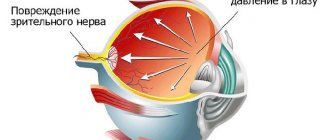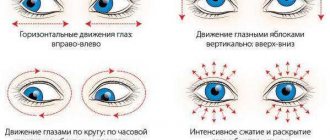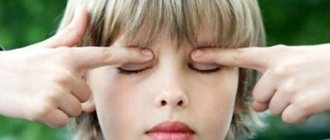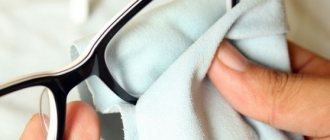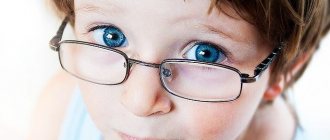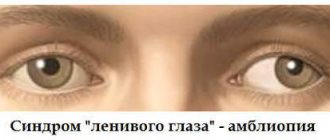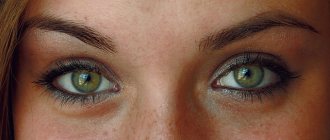Visual hygiene: how to properly care for your eyes
The human eye weighs 8 grams. But in order to save these precious 16 grams, sometimes you have to make significant efforts. Although for most people, for long and happy vision, you need to follow very simple hygiene rules, which we’ll talk about today.
Don't close your eyes when you wash your face! Water should get not only on the eyelids, but also on the eyes.
- We wash ourselves according to science. Eye care is primarily the prevention of infectious diseases. How to properly wash your eyes?
- To wash hands.
- Wash your face at least twice a day.
- You can wash your eyes with clean running water or a decoction of chamomile, mint, or sage.
- When washing your face, you don’t need to close your eyes too much; the water should get not only onto your eyelids, but also onto your eyeballs!
- Dry yourself with a personal towel.
- You can also wipe your eyes with a cotton pad soaked in water or a decoction of herbs. The direction of movement is from the temple to the inner corner of the eye. For each eye - a separate cotton pad.
Useful gadgets for the eyes
Gadgets can not only harm vision, but also work to preserve it. Let's talk about some modern eye aids.
Use the offer store on your smartphone. There will be things useful for your vision there.
- Massager glasses. Manufacturers promise that they will improve blood flow in the eye area, tone muscles, and normalize eye pressure.
- Relax glasses will help relieve eye fatigue and relax the eye muscles.
- Training glasses, perforated. Thanks to the holes, they prevent the eye muscles from atrophying and train them.
- Mobile applications “Eye acuity test” and “iKulist”, with which you can test your vision and identify possible visual impairments.
- Programs with sets of useful exercises for the eyes: EyeCorrector, Vision+.
If you wear contact lenses:
- do not use lenses for more than 19 hours;
- do not sleep in lenses;
- do not swim with lenses on;
- wear lenses according to the manufacturer's instructions and doctor's recommendations;
- wash your hands before putting on or removing lenses;
- refuse contact lenses if you have a cold, when the body is weakened and dehydrated - during these periods the eyes become dry, opening the way for infections.
If you wear glasses:
- use glasses of current diopters;
- Make sure your glasses lenses are always clean;
- Change your glasses every 2–3 years—scratches on the lenses are harmful to your eyes.
Positive effects on eye health:
- balanced diet;
- rejection of bad habits;
- adherence to daily routine;
- good sleep;
- eye gymnastics.
If you have questions about eye hygiene, contact our specialists or ask them during a consultation with an ophthalmologist.
Visual hygiene in children
Today, statistics on the number of children with vision problems are disappointing. More than half of schoolchildren wear glasses, and study loads increase every year. That is why visual hygiene in children plays an important role in maintaining health. Important aspects of this issue: reading, television, computer and the child's vision.
Eyes and reading: visual hygiene for preschoolers
Reading puts a serious strain on the visual organs, especially in children. The process consists of moving the gaze along the line, during which stops are made to perceive and comprehend the text. Most often, preschoolers make such stops without sufficient reading skills - they even have to return to the text they have already read. At such moments, the load on vision reaches its maximum.
Research has shown that mental fatigue slows down reading speed and text comprehension, which increases the frequency of recurrent eye movements. Even more, visual hygiene in children is violated by incorrect “visual stereotypes” - stooping while reading, insufficient or too bright lighting, the habit of reading while lying down, on the go, or while transport is moving (in a car or subway). With a strong forward tilt of the head, the bending of the cervical vertebrae compresses the carotid artery, narrowing its lumen. This leads to a deterioration in the blood supply to the brain and organs of vision, and along with insufficient blood flow, oxygen starvation of the tissues occurs.
Optimal conditions for the eyes when reading are zoned lighting in the form of a lamp installed to the left of the child and directed at the book. Reading in diffused and reflected light causes visual strain and, accordingly, eye fatigue.
The quality of the font is also important: choose prints with clear font on white paper.
Avoid reading during vibration and movement, when the distance between the eyes and the book is constantly shortening and increasing.
Even if all conditions for visual hygiene are observed in schoolchildren, take a break every 45–50 minutes and change the type of activity for 10–15 minutes - while walking, do eye exercises. Children should adhere to the same scheme while studying - this will ensure that their eyes rest and the student maintains proper visual hygiene.
Eyes and computer
Does a child's eyesight deteriorate from a computer? This is a question many modern parents ask. After all, computers are used not only for entertainment, but also for learning. When working at a computer, the general lighting and tone of the room play an important role for the vision of adults and children.
Make sure that there are no significant differences in brightness between light sources: all lamps and luminaires should have approximately the same brightness. At the same time, the power of the lamps should not be too strong - bright light irritates the eyes to the same extent as insufficient lighting.
To maintain visual hygiene for children and adults, the coating of walls, ceilings and furniture in an office or child’s room should have a low reflectance coefficient so as not to create glare. Shiny surfaces have no place in a room where you or your children spend a significant amount of time.
In bright sunshine, shade the windows with curtains or blinds - to prevent visual impairment, it is better to use more stable artificial lighting.
Position your desk – yours or a student’s desk – so that the angle between the window and the desk is at least 50 degrees. It is unacceptable to place a table directly in front of a window or so that the light is directed at the back of the person sitting at the table. Follow the rule: children's desk lighting should be approximately 3-5 times higher than the general illumination of the room.
The desk lamp should be placed on the left for right-handed people and on the right for left-handed people.
These rules apply to both the organization of the office and the children's room.
Vision and TV
The main cause of visual hygiene problems in preschoolers is television. How long and often you need to watch TV is entirely your decision. But remember that watching TV for too long causes excessive strain on accommodation and can lead to gradual deterioration of vision. Unsupervised spending time in front of the TV is especially dangerous for children's eyesight.
Take regular breaks, during which you do eye exercises, and also undergo an examination by an ophthalmologist at least once every 2 years.
Visual hygiene in children, as well as other family members, includes following the rules for installing a TV.
- Calculate the minimum distance to the TV screen using the following formula: for HD (high definition) screens, divide the diagonal in inches by 26.4. The resulting number will indicate the minimum distance in meters. For a regular TV, divide the diagonal in inches by 26.4 and multiply the resulting number by 1.8.
- Sit on the sofa in front of the TV: the screen should be at eye level, not higher or lower, without creating an uncomfortable viewing angle.
- Position the light sources so that they do not cast glare on the screen.
- Do not watch TV in complete darkness; keep a dim lamp with diffused light on, located out of sight of adults and children watching TV.
Why is personal eye hygiene so important?
But no matter how important traditional personal hygiene is, eye care today has moved to a different plane, which is determined by the full-scale computerization of society. The notorious office syndrome, with its chronic eye fatigue and dryness of the ocular surface, and sometimes the development of more serious eye pathologies, has made visual hygiene an integral part of the struggle to increase the productivity and efficiency of intellectual work. However, eye care and personal visual hygiene are important not only for those who are forced to sit for hours in front of a monitor screen, but also for representatives of other professions, for example, drivers, machinists, pilots, processing machine operators, in short, all those whose work involves with excessive visual tension and rare blinking.
The importance of eye hygiene is due to another, far from obvious reason. Unlike bones, ligaments, muscles and even internal organs, some eye tissues are practically impossible to regenerate. In the best case, pathology of the lens and cornea can be corrected with glasses, laser interventions or surgery. In the case of degeneration or injury of the retina and optic nerve head (ONH), even modern treatment methods do not always help. Retinopathy in diabetes and vascular pathologies, and even more so atrophy of the optic disc (with glaucoma, for example) in the vast majority of cases are irreversible. This is exactly the case when a disease is easier to prevent than to treat.
Hypertension is extremely insidious: even a slight increase in blood pressure has an extremely negative effect on the condition of the small blood vessels that supply the retina and optic disc. If, during physical exertion and work in an inclined position, or prolonged visual strain, a person periodically experiences hemorrhages in the sclera (whites) of the eyes, it means that he has weak blood vessels and he needs to take timely care of his eye health and consult a doctor.

